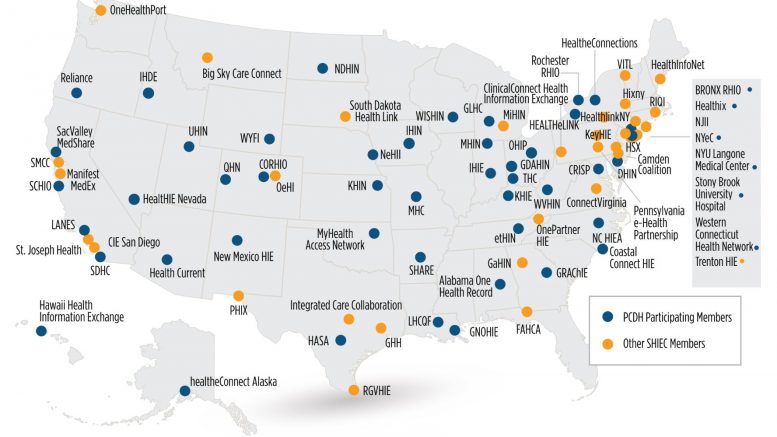David Kendrick, MD, SHIEC Board Member presented survey data from first national HIE survey at the ONC Annual Meeting in Washington, DC on January 28, 2020
Community health information exchanges (HIEs) report robust connections with community and social service organizations and are moving significant volumes of data, according to the results of the first annual survey of HIEs by the Strategic Health Information Exchange Collaborative (SHIEC). Results of the survey were presented by David Kendrick, MD, MPH, at the ONC Annual Meeting in Washington, D.C. on Tuesday January 28, 2020. Dr. Kendrick is the founder and CEO of MyHealth Access (Tulsa, OK) and is on the Board of Directors of SHIEC. Dr. Kendrick and his team at the University of Oklahoma compiled the results of the survey.
Nearly all responding HIEs have partnered with one or more of the following community and social service organizations: correctional health, social service agencies, drug and alcohol treatment programs, first responders, school nurses or blood banks. The responding SHIEC HIEs are exchanging 3.3 billion messages annually and delivering 453 million alerts of admissions, discharges and transfers (ADTs) to HIE participants to improve coordination of care, including nationwide HIE to HIE alerts through the Patient Centered Data Home (PCDH) initiative.
Community HIEs are serving nearly all Americans and deliver significant, valuable data, according to Dr. Kendrick. “In a value-based health care environment, HIEs are partnering with the community and social service agencies that help clinicians care for the whole patient,” Kendrick said, “and they are exchanging significantly more data than any other national exchange network.”
Dr. Kendrick also noted the growing presence and value of the Patient Centered Data Homeä initiative (PCDH).
“PCDH is the only nationwide interoperability network to proactively deliver alerts, and it continues to grow rapidly, ensuring that patients’ information follows them wherever they seek care. America’s community HIEs span the nation today and are a cost-effective component of critical national infrastructure,” Kendrick said.
The survey results demonstrate real progress for the SHIEC community, according to Kelly Hoover Thompson, CEO of SHIEC.
“These results not only demonstrate tangible progress toward interoperability in the sheer volume of alerts and transactions, they also underscore the value of the SHIEC community in supporting and gathering data from community and social service organizations that advance care for the whole patient,” Thompson said.
Results of the survey are available here.

